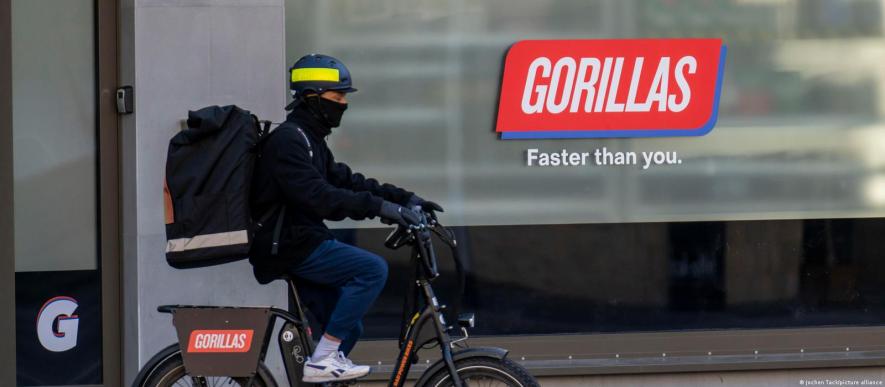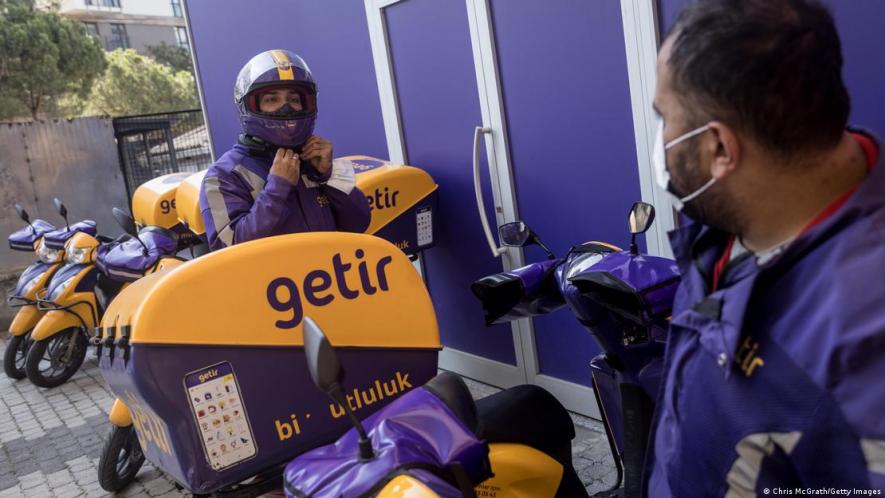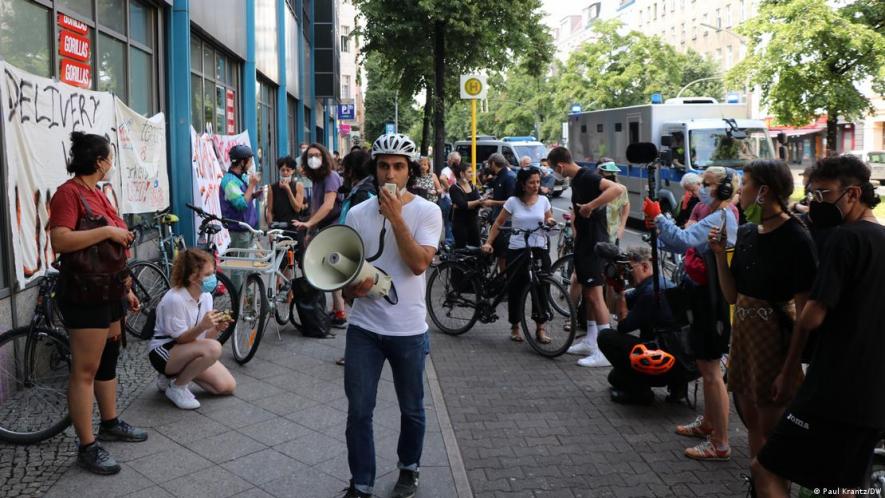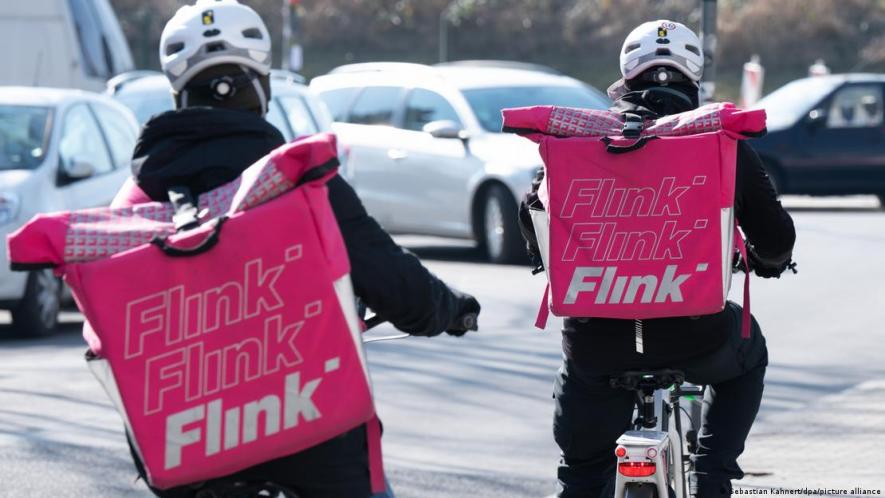Delivery Apps Disappear in Europe as Funding Runs Out

Demand for grocery delivery services boomed during COVID-19 restrictions in 2020, allowing new startups to collect massive investments to expand their businesses. Two Berlin-based grocery delivery apps, Gorillas and Flink, both succeeded in attaining unicorn status in 2021, which means they achieved a valuation above a billion dollars.
Meanwhile Getir, a Turkish-based competitor, expanded its business to Germany, France and the Netherlands. Getir also became Turkey's second unicorn, and reached a valuation of €12 billion ($12.7 billion).
The quick commerce sector, or Q-commerce for short, typically aims for delivery in less than an hour. But soaring inflation throughout 2022 has diminished overall customer demand for quick deliveries.
Perhaps more significantly for these startups, investors are becoming more cautious with their millions. As investment funds dwindle, and rapid delivery businesses struggle to demonstrate profitability, it seems as though the grocery delivery bubble has finally burst.
A year of acquisitions and slashed valuations
This year has brought widespread consolidation in the grocery delivery sector, with businesses dropping out or being acquired rapidly.
In May 2022, Gorillas laid off roughly half of its headquarter staff, and pulled out of Italy, Spain, Denmark and the Netherlands. At that time a spokesperson for Gorillas told DW that the company was focusing on building a profitable business after an initial period of growth.

Getir is likely after Gorillas' 70 'dark store' delivery warehouses spread across 23 cities
In hindsight, that moment may have marked the beginning of the end of the Q-commerce boom. In the same month, Getir also laid off workers, and Flink acquired Cajoo, a French competitor.
At the end of 2022, Getir closed a deal to acquire Gorillas, effectively merging two of Europe's biggest competitors and increasing Getir's dominance in the European market. However, the terms of the deal signify a hefty valuation drop for both companies.
Consolidation at any cost?
As reported by the Financial Times, at its time of acquisition, Gorillas was valued at $1.2 billion, less than half of the $3.1 billion valuation it received after its last fundraising round in September 2021.
The high cost of acquiring new customers combined with record-breaking inflation is a challenge not many grocery delivery startups have been able to meet. It appears as though Gorillas burned through $1.3 billion in investment funding rather quickly, and then looked for a buyer before crashing completely.
Getir comes out of the deal with a valuation of $10 billion, which is lower than its value in March despite having now acquired all of Gorillas' business.
Reportedly, Gorillas' investors will receive about $40 million in cash plus equity in Getir's ongoing business. Kagan Sümer, the CEO and founder of Gorillas, is expected to leave the company with a multimillion-dollar payout.
Gorillas did not respond to DW's request for comment.
A spokesperson for Getir said the acquisition "underscores how Getir leads consolidation in this sector." Nazim Salur, the founder of Getir, said in a written statement that: "The superfast grocery delivery industry will steadily grow for many years to come and Getir will lead this category it created seven years ago."
Why buy a failing company?
Getir's acquisition of Gorillas was whispered about among employees and people familiar with the businesses weeks before the deal was finalized. Many wondered why Getir would risk buying a company that appeared to be losing money.
It may be that Gorillas' real estate is worth more to Getir than the value of the company itself. Gorillas succeeded in expanding rapidly across Europe through 2021, and in doing so it established a network of delivery warehouses, also sometimes called "dark stores." As of this past May, the company operated 70 of these warehouses in 23 cities.
Starting in 2020, dark stores popped up in every central neighborhood in Berlin and across other major cities in Europe. Immediately these storefronts drew complaints from local residents who resented the noise, the increased traffic of delivery trucks and groups of loitering employees.

Delivery teams have long complained about poor pay and working conditions
In reaction to these complaints, several cities in the Netherlands have already enacted a temporary ban on new dark stores. Similar legislation has been proposed in other European cities. Seeing that establishing new dark stores will likely become more difficult going forward, Getir may have been eager to grab those that Gorillas has already set up.
Precarious working conditions unlikely to improve
Consolidation of the industry isn't necessarily helping delivery riders and warehouse workers, who have claimed that speedy grocery businesses create unsafe working conditions and exploit workers.
As of yet, it's unclear what Getir's acquisition of Gorillas means for employees. One former Gorillas delivery rider told DW that many of their colleagues don't feel secure in their current jobs. They added that in the weeks leading up the acquisition, managers were looking for any reason to fire people.
This former Gorillas employee wished to remain anonymous because they are bringing a case against the company for unpaid wages. It's unclear what Getir's acquisition of Gorillas means for the case.

Flink is one of the three remaining big players in Europe's quick grocery delivery sector
Who's left to deliver groceries in 2023?
As 2022 comes to an end, only three big players remain in Europe's speedy grocery delivery sector: Getir, Flink and US-based Gopuff. All of them still face the challenge of marketing to a customer base that is increasingly opting for savings over convenience.
However, a couple of smaller startups have managed to collect further investments despite the market's rather grim outlook.
Norwegian-based Oda succeeded in raising about $151 million in December, to further expand its operations in Norway, Germany and Finland. Hamburg-based Circus found another €11 million to continue developing its meal-delivery operations. But who will be left to deliver groceries at the end of 2023 is up in the air.
Edited by: Tim Rooks
Get the latest reports & analysis with people's perspective on Protests, movements & deep analytical videos, discussions of the current affairs in your Telegram app. Subscribe to NewsClick's Telegram channel & get Real-Time updates on stories, as they get published on our website.
























